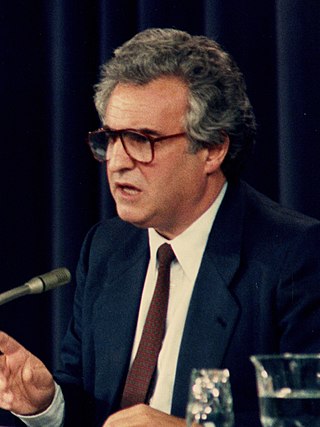
Isidora Dolores Ibárruri Gómez, also known as Pasionaria, "the passionate one", was a Spanish Republican politician of the Spanish Civil War of 1936–1939 and a communist known for her slogan ¡No Pasarán! issued during the Battle for Madrid in November 1936.

Fernando Arrabal Terán is a Spanish playwright, screenwriter, film director, novelist, and poet. He was born in Melilla and settled in France in 1955. Regarding his nationality, Arrabal describes himself as "desterrado", or "half-expatriate, half-exiled".

Mariano Rajoy Brey is a Spanish politician who served as Prime Minister of Spain from 2011 to 2018, when a vote of no confidence ousted his government. On 5 June 2018, he announced his resignation as People's Party leader.

Alberto Ruiz-Gallardón Jiménez is a Spanish politician and former Minister of Justice. He was mayor of Madrid between 2003 and 2011. A stalwart of the conservative People's Party (PP), he has previously been a leading figure in various local and national legislative bodies. In December 2011 Ruiz-Gallardón was appointed Minister of Justice in Mariano Rajoy's inaugural cabinet. He resigned in September 2014.

Fernando Fernández-Savater Martín is a Spanish philosopher, essayist and author.

The 1977 Atocha massacre was an attack by right-wing extremists in the center of Madrid on January 24, 1977, which saw the assassination of five labor activists from the Communist Party of Spain (PCE) and the workers' federation Comisiones Obreras (CC.OO). The act occurred within the wider context of far-right reaction to Spain's transition to constitutional democracy following the death of dictator Francisco Franco. Intended to provoke a violent left-wing response that would provide legitimacy for a subsequent right-wing counter coup d'état, the massacre had an immediate opposite effect; generating mass popular revulsion of the far-right and accelerating the legalization of the long-banned Communist Party.
The Premio Planeta de Novela is a Spanish literary prize, awarded since 1952 by the Spanish publisher Grupo Planeta to an original unpublished novel written in Spanish. It is one of about 16 literary prizes given by Planeta.
José María Ruiz-Mateos Sociedad Anónima (Rumasa) was a holding company founded by Spanish entrepreneur José María Ruiz Mateos and expropriated by the Spanish government on February 23, 1983.

Carlos Martínez Gorriarán is a Spanish scholar, born in San Sebastián, Basque Country, Spain. After being a member of marxist and basque nationalist movements, he became one of the founding members and spokespersons of ¡Basta Ya! association and head of the Plataforma Pro from which the Union, Progress and Democracy (UPyD) party emerged in September 2007. In ¡Basta Ya! he was opposed to ETA, and also to the "obligatory nationalism" that he considered to be occurring in the Basque Country. He is a member of the Directing and Political counsels of the party.

13 Roses is a 2007 Spanish-Italian film directed by Emilio Martínez Lázaro. It stars Pilar Lopez de Ayala, Verónica Sánchez and Marta Etura. The plot, based on a true story, follows the tragic fate of Las Trece Rosas, fighting for their ideals in the aftermath of the Spanish Civil War.

Dionisio Ridruejo Jiménez was a Spanish poet and political figure associated with the Generation of '36 movement and a member of the Falange political party. He was co-author of the words to the Falangist anthem Cara al Sol. In later years he fell from favour with the Francoist State and eventually became associated with opposition groups.

Enrique Múgica Herzog was a Spanish lawyer and politician.

El ministerio del tiempo is a Spanish fantasy television series created by Javier and Pablo Olivares and produced by Onza Partners and Cliffhanger for Televisión Española (TVE). It premiered on 24 February 2015 on TVE's main channel La 1. The series follows the exploits of an investigative team in the fictional Ministry of Time, which deals with incidents caused by time travel that can cause changes to the present day.

Pedro Fernández Checa, usually known as Pedro Checa was a Spanish Communist who played a leading role in the party during the Spanish Civil War (1936–39). After the defeat of the Republic he was forced into exile in the Soviet Union and then Mexico, where he died.

Fernando Sánchez Dragó was a Spanish writer and television host.

A motion of no confidence in the Spanish government of Mariano Rajoy was debated and voted in the Congress of Deputies between 13 and 14 June 2017. It was brought by Unidos Podemos leader Pablo Iglesias as a result of a corruption case involving high-ranking People's Party (PP) officials, amid accusations of maneuvers from the Rajoy government to influence the judicial system in order to cover-up the scandal. This was the third vote of no confidence held in Spain since the country's transition to democracy—after the unsuccessful 1980 and 1987 ones—as well as the first not to be registered by the main opposition party at the time.

Fernando José "Ferran" Gallego Margaleff is a Spanish historian and writer.

My Prison Yard is a 2008 Spanish prison drama film directed by Belén Macías. The female-dominated cast stars Candela Peña and Verónica Echegui alongside Ana Wagener, Blanca Portillo, Patricia Reyes Spíndola and Violeta Pérez.
España, la primera globalización is a Spanish historical documentary film. It was directed by José Luis López-Linares and released in 2021.
Events in the year 2023 in Spain.


















